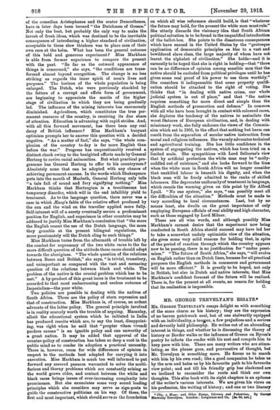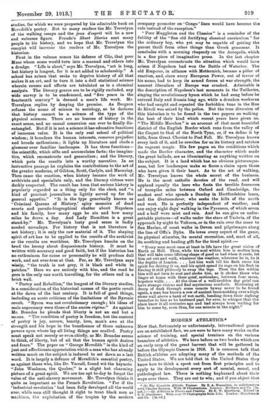MR. GEORGE TREVELYAN'S ESSAYS" Ma. GEORGE TREVELYAN'S essays delight us
with something of the same charm as his history ; they are the expression of no barren patchwork soul, but of one stalwartly equipped with an individuality, a teuWer, a few prejudices and a serious and devoutly held philosophy. He writes out of an abounding interest in things, and whether he is discussing the theory of history or Border walks or the influence of Greece on Byron's poetry be infects the reader with his zest and compels him to keep pace with him. There are many writers who are stimu- lating, as the phrase goes, and provocative of thought, but Mr. Trevelyan is something more. He forces us to march with him by his own road; like a good companion he takes us by the arm and bales us by his favourite path to his favourite view point; and not till his friendly grip has slackened are we inclined to reconsider the route and think our own thoughts. This slim book with its eight chapters is an epitome of the writer's various interests. We are given his views on his profession, the writing of history; and one or two literary
• Clio, a Muse; and Other Essays, Literary and Pedestrian. By George Macaulay Trevolyan. London : Longman and Co. [fie. 6d. net.]
studies, for which we were prepared by his admirable book on Meredith's poetry. But to many readers the Mr. Trevelyan of the walking essays and the jeux d'esprit will be a new and welcome figure. Froude's Short Stories sent many people to his history, and we hope that Mr. Trevelyan the essayist will increase the readers of Mr. Trevelyan the historian.
First in the volume comes his defence of Clio, that poor Muse whom some would turn into a maenad and others into a drudge. "Life is short," says Mr. Trevelyan, "art is long, but history is longest, for it is art added to scholarship." A school has arisen that seeks to deprive history of all that makes it an art, and to turn it into a dull statistical science wherein causes and effects are tabulated as in a chemical analysis. The literary graces are to be rigidly excluded, any wide survey is to he condemned, and " five years in the fourteenth century" is deemed a man's life work. Mr. Trevelyan replies by denying the premise. As Bergson refuses the name of science to sociology, so he declares that history cannot be a science of the type of the physical sciences. There are no lessons of history in the exact sense, and no causal connexion can ever be finally dis- entangled. But if it is not a science it has educative functions of immense value. It is the only real school of political wisdom; it broadens the human interests, removes prejudice and breeds enthusiasm ; it lights up literature and sheds a glamour over familiar landscapes. It has three functions— the scientific, which sifts and accumulates facts; the imagina- tive, which reconstructs and generalizes ; and the literary, which puts the results into a worthy narrative. In an instructive passage he explains the contributions to the art of the greater moderns, of Gibbon, Scott, Carlyle, and Macaulay. Then came the reaction, when history became the work of archivists and specialists only, and the literary virtues were darkly suspected. The result has been that serious history is popularly regarded as a thing only for the elect, and "a kind of prurient journalism is lightly served up for the general appetite." "It is the type generically known as ' Criminal Queens of History,' spicy memoirs of dead courts and pseudo-biographical chatter about Napoleon and his family, how many eggs he ate and how many miles he drove a day. And Lady Hamilton is a great stand-by." Mr. Trevelyan's lusty good sense is badly needed nowadays. For history that is not literature is not history; it is only the raw material of it. The shaping spirit of art has to be applied to the results of the archivist or the results are worthless. Mr. Trevelyan knocks on the head the heresy about dispassionate history. It must be written with accuracy and good faith, but if the historian has no enthusiasm for cause or personality he will produce dull work, and not over-true at that. For, as Mr. Trevelyan says wisely, " the truth is not grey, it is black and white in patches." Here we are entirely with him, and the road he goes is the only one worth travelling, for the others end in a brick wall.
" Poetry and Rebellion," the longest of the literary studies, is a consideration of the historical causes of the poetic revolt at the dawn of the last century. It is full of good things, including an acute criticism of the limitations of the Byronic revolt. "Byron was not revolutionary enough ; his ideas of male supremacy were those of the ancien regime." As against Mr. Brandes he pleads that liberty is not an end but a means. " The condition of poetry is freedom, but the content of poetry is joy, sorrow, beauty, love, man's awe at the strength and his hope in the beneficence of those unknown powers upon whose lap all living things are cradled. Poetry must speak not merely or even chiefly, as Mr. Brandes seems to think, of liberty, but of all that the human spirit desires and fears." The paper on " George Meredith" is the kind of just and affectionate appreciation which a man who has already written much on the subject is induced to set down as a last word. It is largely a defence of Meredith's essential poetry, as against those who, like Dr. Verrall, found wit the keynote. "John Woolman, the Quaker," is a slight but charming picture of a great spirit. We are too apt to-day to forget the value of the anti-slavery movement. Mr. Trevelyan thinks it quite as important as the French Revolution. " For if the `industrial revolution' had been fully developed all the world o7er, while men still thought it right to treat black men as machines, the exploitation of the tropics by the modern
company promoter on Congo' lines would have become the rule instead of the exception."
" Poor Muggleton and the Classics " is a reminder of the futility of the "fine old fortifying classical curriculum" for the ordinary boy, who yet may be capable of getting the purest thrill from other things than Greek grammar. It concludes with a morning rhapsody on the Acropolis, which is a fine piece of imaginative prose. In the last chapter Mr. Trevelyan reconstructs the situation which would have arisen if Napoleon had won the Battle of Waterloo. The old Emperor, in alliance with Metternich, became a pillar of reaction, and, since every European Power, out of terror of his name, had to keep its armed forces at war strength, the nascent liberalism of Europe was crushed. Admirable is the description of Napoleon's last moments in the Tuilleries, singing the revolutionary hymn which he had sung before he entered Italy and Russia long ago, while a drunken workman who had caught and repeated the forbidden tune in the Rue de Rivoli was seized by the police. But the true diversion of this historian is to be found in the two papers on walking the best of their kind which recent years have given us.
"The Middle Marches" is an account of that most beautiful district of the English Border which runs from the valley of the Coquet to that of the North Tyne, or, if we define it by hills, from Great Cheviot to Peel Fell. Mr. Trevelyan knows every inch of it, and he rewrites for us its history and catches its vagrant magic. His few pages on the conditions which made the Border character, and the character which made the great ballads, are as illuminating as anything written on the subject. It is a land which has no obvious picturesque- ness, but few landscapes make so fierce a claim upon those who have given it their heart. As to the art of walking, Mr. Trevelyan knows the whole secret of the business. He is the most catholic devotee of the road, and will applaud equally the hero who foots the terrible fourscore of turnpike miles between Oxford and Cambridge, the modest soul who spends a Sunday in Hertfordshire lanes, and the Gratwanderer, who seeks the hills of the north and west. He is perfectly independent of weather, and can enjoy eight days' walking in the Pyrenees, of which seven and a half were mist and rain. And he can give us unfor- gettable pictures—of walks under the stars of Umbria, of the approach by night to Volterra, or in the rain over the moor to San Marino, of coast walks in Devon and pilgrimages along the line of Offa's Dyke. He loves every aspect of the game, its physical stimulus, its mental recreation, and, most of all, its soothing and healing gift for the tired spirit :—
" Every man must once at least in life have the great vision of Earth as Hell. Then, while his soul within him is molten lava that will take some lifelong shape of good or bad when it cools, let him set out and walk, whatever the weather, wherever he is, be it the depths of London. . . . Let him walk till his flesh curse his spirit for driving it on, and his spirit spend its rage on his flesh in forcing it still pitilessly to sway the legs. Then the fire within him will not turn to soot and choke him, as it chokes those who linger at home with their grief, motionless, between four mean, hopeless walls. . . . At the close of a well-trodden day grief can have strange visions and find mysterious comforts. Hastening at droop of dusk through some remote byway never to bo found again, a man has known a row of ancient trees nodding over a high stone wall above a bank of wet earth, bending down their sighing branches to him as he hastened past for ever, to whisper that the place know it all centuries ago and had always been waiting for him to come by, even thus, for one minute in the night."



















































 Previous page
Previous page